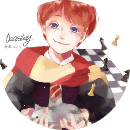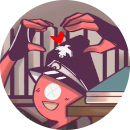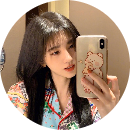Talk about life on space station.

Những câu hỏi liên quan
D. READING: Read the article about homes in the future (2,0pts).
ASTRONAUTS DAILY LIFE
Astronauts lives are very different on a space station. They cannot have showers because there is no gravity and everything floats in space. The astronauts have to use soap and wet towels. They have to use a special toilet, too. Meal times are very different to the ones at home. The astronauts have to eat dried food in bags. They have to sleep in sleeping bags when they are tired. A...
Đọc tiếp
D. READING: Read the article about homes in the future (2,0pts). ASTRONAUTS' DAILY LIFE Astronauts' lives are very different on a space station. They cannot have showers because there is no gravity and everything floats in space. The astronauts have to use soap and wet towels. They have to use a special toilet, too. Meal times are very different to the ones at home. The astronauts have to eat dried food in bags. They have to sleep in sleeping bags when they are tired. Astronauts tie their sleeping bags to the walls so they don't float around. Life in space is not the same as life on Earth. I. Answer the questions (1,0pt). 1. Why can't astronauts shower in space? → ……………………………………………………………………………………………. 2. How do astronauts clean themselves in space? → ……………………………………………………………………………………………. 3. What do they eat in space? → ……………………………………………………………………………………………. 4. Do astronauts tie their sleeping bags to the wall? → …………………………………………………………………………………………….
1.Because there is no gravity.
2.They have to use soap and wet towels.
3.They eat dried foods in bags.
4.Yes,they do.
Đúng 1
Bình luận (0)
Topic 1: Pollution -Talk about the ways to reduce pollution in Dak Lak Topic 2: Science and technology -Talk about your favorite smart device Topic 3: Life on other planet -Talk about your dream life on other planet Topic 4: Natural disasters -Talk about the effect of natural disasters how people to reduce them Cần gấp trong chiều ni ạ😢
a. Listen to Major Tomkins, an astronaut, talking about life on a space station. What’s the question people ask him the most?
(Lắng nghe Major Tomkins, 1 phi hành gia, nói về cuộc sống ở một trạm không gian. Mọi người hỏi anh ấy câu hỏi nào nhiều nhất?)
Bài nghe:
Interviewer: Hello and welcome Science World! Our guest is Astronaut Major Tomkins.
Major Tomkins: Hi
Interviewer: Today’s questions come from our social media page. Trang, a student from Viet Nam, asks: “What do you do in your free time?”
Major Tomkins: I like to look at the stars, the Moon and the Earth outside. They’re beautiful.
Interviewer: Lily, a student from USA, want to know how you sleep.
Major Tomkins: We use sleeping bags. We have to lock them to the wall because there’s no gravity in space.
Interviewer: Interesting. Next, Alex, a student from Russia asks: “How do you use toilet?”
Major Tomkins: You know, that’s a question I get asked the most. It is a big problem.
Tạm dịch:
Phóng viên: Chào mừng đến với Thế giới Khoa học. Khách mời của chúng ta là Major Tomkins.
Major Tomkins: Xin chào
Phóng viên: Câu hỏi hôm nay các trang truyền thông của chúng tôi. Trang, một học sinh từ Việt Nam, hỏi “Bạn thường làm gì vào thời gian rảnh rỗi?”
Major Tomkins: Tôi thích ngắm những ngôi sao, mặt trăng, Trái Đất. Chúng rất là đẹp.
Phóng viên: Lily, một học sinh đến từ Mỹ, muốn biết bạn ngủ như thế nào?
Major Tomkins: Chúng tôi sử dụng túi ngủ. Chúng tôi phải treo trên tường bởi vì nó không có trọng lực.
Phóng viên: Thật là thú vị. Tiếp theo, Alex, một học sinh đến từ Nga, hỏi bạn đi vệ sinh như thế nào?
Major Tomkins: Bạn biết đấy, đây là câu hỏi tôi nhận được nhiều nhất. Nó là một vấn đề lớn.
Đúng 0
Bình luận (0)
talk about a day in the life of an astronaut aboard the international space station
em đag cần gấp giúp em vsss
soạn topic dùm mình mai thi òi
topic 1: Talk about your learning and using English
topic 2: Talk about changing roles of Vietnamese women nowadays
topic 3: Talk about the life on the space
topic 4: talk about the eating habits of Vietnamese people
nhaaaaaaaaaaaaaaaaaa. thank nhìu
Topic 1:
Unlike in the old days, we could only learn English through radio books, television and in school. There are many more ways to learn English today, especially through the internet, smartphones and many English learning centers opened up. There is no compulsory method to learn English, but each person must find a suitable way to learn it effectively. Many people will think that learning English is difficult, but what we need to do is get our own way of learning and an effort. Using the right vocabulary and sentence structure correctly requires a long process, but we can always invent new learning methods. We can go to parks or join English-speaking clubs for a chance to speak with foreigners, and that helps us improve our grammar and accent. Books, movies, songs, and newspapers in English are also what help us get used to how foreigners use it. The key to learning English is that we should not try to remember everything in the notebook, but we need to meet and practice it in real life. But learning English can be more effective when we can create our own learning styles.
Đúng 3
Bình luận (0)
Topic 3
As far as you know "space" can mean all things that exist, it is a vast space. The space travel is always a hot topic being put on the screen or hit. top-selling newspaper products in the world. You must have seen many pictures of astronauts suspended in the cabin, eating dishes in small tubes such as toothpaste, drinking water in the form of spheres? And you have always assumed that this is the life of astronauts in space, there are some interesting phenomena happening now in the absence of gravity. On the one hand, the fluids in your body tend to move up above your head, so your facial skin will be inflated like a balloon, and the absence of gravity can make you feel disoriented. A trip into space always has fun things, but there are also some issues that make it difficult for you to stay for a while. However, one thing is for sure that the experiences you have in the universe will be ones that you will never forget.
Đúng 3
Bình luận (2)
Topic 4
In different countries around the world, there are many countries with different eating habits. So is the Vietnamese. We have a habit of organizing a combination meal, eating together, so members of the meal are related and closely dependent on each other, so we must be careful when sitting and eating. This is a high expression in Vietnamese community life. In the structure of Vietnamese meals, while other dishes are eaten by people, others are not, while rice and fish sauce are used by everyone. Therefore, the cup of gravy becomes a measure of thoughtfulness, measuring the level of human culture. In the structure of Vietnamese meals, while other dishes are eaten by people, others are not, while rice and fish sauce are used by everyone. Therefore, the cup of gravy becomes a measure of thoughtfulness, measuring the level of human culture. A typical meal consists of rice, soup, sautéed or boiled vegetables and main dishes cooked from meat, fish, eggs, etc. To sustain life with predominantly wet rice agriculture, it influences Vietnamese people's eating habits. In short, this habit has become an important cultural life of our Vietnamese people from past to present.
Đúng 1
Bình luận (0)
Xem thêm câu trả lời
Complete the second sentence so that it means the same as the first one 1.The bus station is behind the supermarket -> The supermarket_____________________ 2.Life in space is different from life on Earth ->Life in space_____________________________ 3.We can catch the bus or the train to go to Moc Chau Highland ->We can go ____________________________
Xem chi tiết
1 is in front of the bus station
2 is not the same as life on Earth
3 to Moc Chau Highland by bus or by train
Đúng 0
Bình luận (0)
talk about which planet do you want to live? write about the life on that planet
Talk about life on another planet.
giúp e vs ạ!!
em sắp thi nói rùi:((
Bạn tk:
The gas giant Jupiter, the next planet beyond Mars in the solar system, is inhospitable to life in any currently imaginable form. But its icy moons – especially Europa – have potential. A number of missions have flown past Jupiter and its moons on route to other places, but Nasa’s Galileo mission was the first designed to specifically orbit the planet and study its moons. It collected images and data in the Jovian system from 1995 to 2003, passing Europa 12 times.
Jupiter’s moon Europa is one of the most likely places to harbour life outside Earth, with its liquid oceans and gravitational energy sources
Pictures and data collected by this spacecraft suggest that Europa has a layered structure like Earth: an iron-rich core, a rocky mantle and a crust of ice. Magnetic field measurements found an electric current inside, consistent with a salty liquid ocean beneath the thick crust of ice around the whole planet. Photographs showing huge cracks in the ice, taken by the same mission, support this idea.
Europa’s surface resembles Earth’s sea ice in Antarctica, explains François Poulet from the Institute of Space Astrophysics at the Université Paris-Sud in France: ‘It indicates that the ice is geologically pretty young and it could be proof of its interaction with a reservoir of liquid water.’ In December 2012, the Hubble Space Telescope also detected water vapour above Europa’s South Pole and it was proposed this came from erupting water plumes. Spacecraft have not yet seen these plumes, however, so if they do exist they must be intermittent.
So, Europa probably has water. But what about the other two necessary components to be habitable? It has a source of heat energy coming from the friction of being pulled towards Jupiter’s gravitational field by different amounts during different stages of its elliptical orbit. There is also plenty of radiation around Jupiter to potentially start chemical reactions (strong enough to also very quickly destroy any organic compound formed). But whether it has the correct raw chemical ingredients isn’t yet known; modelling suggests that it might, but more hard data is needed.
In 2022, both the European Space Agency (ESA) and Nasa plan to launch spacecraft that will get up close and personal with Europa. ESA’s Jupiter Icy Moons Explorer (Juice) will take over seven years to reach the Jovian system. ‘We will arrive at the end of 2029 and start operation during 2030,’ says Poulet, a member of the team developing the visible and infrared spectrometer onboard called Majis (Moons and Jupiter Imaging Spectrometer). The main target of the Juice mission is Ganymede, another of Jupiter’s moons, but Europa will receive two flybys. Majis will characterise the surface composition of this moon and – together with the UV spectrometer onboard – determine the composition of Europa’s very thin atmosphere. Other cameras and spectrometers will also help build understanding of this icy world’s interior and crust.
For Nasa’s Europa Clipper mission, Europa is the star of the show. While the seemingly obvious mission would be to orbit Europa for a few years, any spacecraft doing this would be exposed to life-shortening radiation from Jupiter. Instead, Europa clipper will orbit Jupiter, dipping in and out of its radiation belt. It will carry out at least 45 close flybys of Europa over three and a half years. A mixture of cameras and spectrometers will examine the moon and its tenuous atmosphere. If the water plumes above the South Pole do exist, it will also be able to fly through these and therefore directly measure the chemical composition of the moon’s ocean. If the Europa Clipper launches in 2022, there are two possible arrival times for it: 2025, if Nasa’s new Space Launch System (SLS) that is currently in development is used, or January 2030, if a traditional rocket is used.
Đúng 1
Bình luận (1)
Read the following passage and choose the best answer for each question.Where will you go on your next vacation? Disneyland? Sea World? Outer space?That’s right; tourists are now paying big bucks to travel into space with astronauts! The first space tourist was Dennis Tito, an American businessman. In 2001, he paid about $20 million to ride on a Russian rocket to the International Space Station. The Space Station circles 220 miles above Earth. Tito stayed on the station for a week, hanging out w...
Đọc tiếp
Read the following passage and choose the best answer for each question.
Where will you go on your next vacation? Disneyland? Sea World? Outer space?
That’s right; tourists are now paying big bucks to travel into space with astronauts! The first space tourist was Dennis Tito, an American businessman. In 2001, he paid about $20 million to ride on a Russian rocket to the International Space Station. The Space Station circles 220 miles above Earth. Tito stayed on the station for a week, hanging out with astronauts and eating space food. The latest space tourist was Anousheh Ansari, an Iranian-born woman from the United States who went to the Space Station in mid-September 2006.
How safe is space travel? Apart from the risk of crashing, space tourists have some special things to worry about. Earth’s atmosphere protects us from dangerous radiation from the sun. Space travelers are exposed to more of the sun’s rays. But for tourists spending only a few days or weeks in space, the radiation probably isn’t harmful.
A bigger problem might be space sickness. Without Earth’s gravity to hold them down, visitors to the Space Station float around inside the craft. It may look like fun on TV, but it can make first-time space travelers dizzy and sick. Luckily, the sickness usually wears off quickly. Then space tourists can enjoy their trip and the amazing view of Earth.
Traveling to space _____.
A. Will be available to everyone
B. Is not expensive
C. Will be limited to the very wealthy
D. Will be limited to the very poor





















